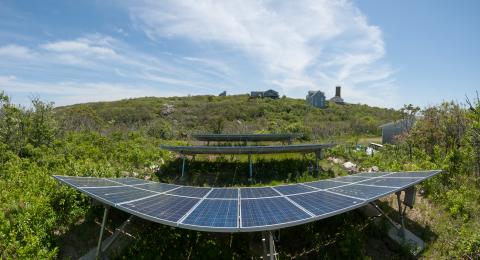The Sustainable Energy minor at UNH gives you essential knowledge and skills to address critical energy challenges and contribute to the green energy sector. You’ll enhance your employability in industries focused on reducing carbon footprints and innovating within environmental standards.
What is sustainable energy?
In the sustainable energy minor, you’ll be introduced to the complex challenges of safeguarding the environment while using natural resources to produce renewable energy for a growing global population. This interdisciplinary minor focuses on critical thinking in the areas of technology, engineering, and social and economic policy. You’ll explore domestic energy systems and ways to develop and build acceptance of sustainable energy resources. You’ll study topics such as renewable technologies, energy engineering, green building and development, or innovations in policy and economics. This minor is a great compliment to majors in business, engineering, chemistry or environmental studies.
Why study sustainable energy at UNH?
You’ll work across departments with award-winning faculty who have expertise in areas ranging from natural resources and chemical, civil and environmental engineering to community and environmental planning and sociology. UNH is among nation’s highest-performing research universities, and you’ll be encouraged to gain hands-on experience by participating in research projects. The electives in the minor offer you the opportunity to design a program that meets your individual interests.
Potential career areas
- Electricity transmission and storage
- Energy engineering
- Green architecture
- Natural resources management
- Oil and gas industry
- Policy analysis
- Renewable energy
- Research
- Solar panel engineering
Curriculum & Requirements
The Minor in Sustainable Energy provides the flexibility and focus that allows for students to expand their exposure to the topic within the context of their own major. The goal of the program is to match the developing nature of the field with the skills needed to understand sustainable energy in the greater context of its opportunities and challenges. Courses in the minor will build on existing competencies and create an experience that provides an exposure to new the perspectives and conceptual framework that is at the core of the developing field of sustainable energy.
Objectives
The objectives of the Minor in Sustainable Energy are to provide students with the educational experience necessary to participate in one of the fastest growing fields of employment. Coupled with an ability to focus on meaningful employment, is our challenge to confront a changing climate; students will be given an opportunity to be a part of the solution.
Curriculum and Requirements
The curriculum and requirements for the minor are based on exposure to three competencies that reflect the exposure necessary to grasp the basic understanding of sustainable energy:
- Technical – Requires a basic understanding of the grid, energy flow, energy usage and the technologies of efficiency, generation and management of energy and generation sources.
- Economics and Finance – Requires a basic understanding of utility structure, energy markets and utility rate-making. An additional focus includes the business aspect of financing and projecting the cost-effectiveness of energy generation sources and fuels – including the development of innovative business models for deploying sustainable energy.
- Policy – Requires a basic understanding in policy-making and implementation, including a historic perspective of our utilities, incentives and subsidies and their impact on market forces. An additional focus includes the policy impacts of aspects related to sustainable energy deployment, including, interconnection, net metering and feed in tariffs and tax incentives.
Contact Information
Students with questions about the minor or who would like more information should contact Dr. Julia Novak Colwell in the Department of Natural Resources and the Environment.
- Academic policies related to minors.
- Students must earn a grade of C- or better in order for a course to be counted for credit toward the minor.
- No pass/fail graded course shall count toward the minor.
- Up to 8 credits can be used to satisfy both major and minor requirements.
- Appropriate course substitutes from other study-abroad programs may also be used with permission.
| Code | Title | Credits |
|---|---|---|
| Required Courses | ||
| Introduction: | ||
| NR 507 | Introduction to our Energy System and Sustainable Energy | 4 |
| Critical Thinking: | ||
| NR 606 | International Energy Topics | 4 |
| or CEE 705 | Introduction to Sustainable Engineering | |
| Competency: | ||
| NR 787 | Advanced Topics in Sustainable Energy | 4 |
| Technology/Engineering Category | 3-4 | |
| Select one course from the following: | ||
CHBE 410 | Energy and Environment | |
CEE 520 | Environmental Pollution and Protection: A Global Context | |
CEE 719 | Green Building Design | |
| Social & Economic Policy Category | ||
| Select one course from the following: | 4 | |
NR 602 | Natural Resources and Environmental Policy | |
CEP 673 | Green Real Estate | |
EREC 572 | ||
SOC 565 | Environment and Society | |
TOUR 767 | ||
NR 606 | International Energy Topics | |
| Total Credits | 19-20 | |







